In the theater,
I like my popcorn buttered in the middle and on top.
This particular day, I purchased the jumbo size.
It was the summer of 1981 and Hollywood (with thanks to Stephen Spielberg) had returned to the great adventure movie: Raiders of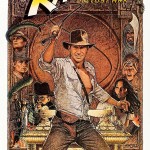 the Lost Ark. Harrison Ford stars in the chase around the world to find the Hebrew Ark of the Covenant. Westerners thought the relic would have great power over its enemies. The nemesis is, of course, the Nazis in the days leading up to World War II. America counters its enemy with a professor of archaeology, Indiana Jones. Jones is known for his swashbuckling exploits in obtaining rare historical finds.
the Lost Ark. Harrison Ford stars in the chase around the world to find the Hebrew Ark of the Covenant. Westerners thought the relic would have great power over its enemies. The nemesis is, of course, the Nazis in the days leading up to World War II. America counters its enemy with a professor of archaeology, Indiana Jones. Jones is known for his swashbuckling exploits in obtaining rare historical finds.
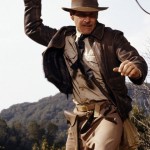 So there I was, eating my popcorn, watching Indiana Jones traipse through the jungle after his latest acquisition. Anyone who loves this film knows the opening scene by heart. Harrison Ford’s character follows both instruction and instinct to obtain his latest find, a precious stone statue hidden in a cave. Danger lurks all around him. The jungle slithers with snakes. Birds call out alarm. Grotesque statues warn of danger lurking at every turn. Jones’ own guide seems not to be trustworthy. All the while, foreboding music fills the moviegoers’ ear with suspense.
So there I was, eating my popcorn, watching Indiana Jones traipse through the jungle after his latest acquisition. Anyone who loves this film knows the opening scene by heart. Harrison Ford’s character follows both instruction and instinct to obtain his latest find, a precious stone statue hidden in a cave. Danger lurks all around him. The jungle slithers with snakes. Birds call out alarm. Grotesque statues warn of danger lurking at every turn. Jones’ own guide seems not to be trustworthy. All the while, foreboding music fills the moviegoers’ ear with suspense.
I too was caught up in the action, unconsciously jamming popcorn into my mouth. In the cave, Jones 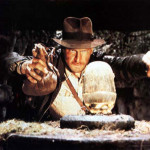 encounters real threats. Pits, poison darts, and impaling spikes were set to guard the treasure. Unfortunate fortune hunters had been there before Jones: we see their skeletal remains. Finally, Indiana reaches the treasure. He offsets the weight of the stone with sand. Jones intuits that taking the prize will result in new dangers. Stone in hand Jones seems to have overcome the obstacle. One could almost hear the collective sigh of relief in the audience. The music, so foreboding up to this point, stopped, and we, the audience, stopped with it. We shared with the character on screen a moment of triumph.
encounters real threats. Pits, poison darts, and impaling spikes were set to guard the treasure. Unfortunate fortune hunters had been there before Jones: we see their skeletal remains. Finally, Indiana reaches the treasure. He offsets the weight of the stone with sand. Jones intuits that taking the prize will result in new dangers. Stone in hand Jones seems to have overcome the obstacle. One could almost hear the collective sigh of relief in the audience. The music, so foreboding up to this point, stopped, and we, the audience, stopped with it. We shared with the character on screen a moment of triumph.
For a moment, just a few seconds, I stopped eating popcorn.
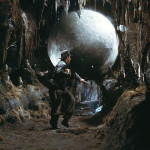 But then it happened. Indiana Jones’ ploy to stop whatever hidden horrors awaited him was found wanting. The pressurized stand holding the sand began to descend. The music began again. My hand instinctively reached for more popcorn. If we thought entering the cave was bad, trying to leave was worse. The cave came alive. The cave did not want its jewel to be stolen. The cave was trying to kill Indiana Jones. Pulse-pounding strains beat through the surround sound speakers. Jones ran his way past booby traps of every sort. His guide turns adversary, seemingly leaves our hero in the lurch. Escaping again, Jones narrowly avoids a drop-down-door intended to keep him forever in the cave. All the while, the music dictates my popcorn consumption.
But then it happened. Indiana Jones’ ploy to stop whatever hidden horrors awaited him was found wanting. The pressurized stand holding the sand began to descend. The music began again. My hand instinctively reached for more popcorn. If we thought entering the cave was bad, trying to leave was worse. The cave came alive. The cave did not want its jewel to be stolen. The cave was trying to kill Indiana Jones. Pulse-pounding strains beat through the surround sound speakers. Jones ran his way past booby traps of every sort. His guide turns adversary, seemingly leaves our hero in the lurch. Escaping again, Jones narrowly avoids a drop-down-door intended to keep him forever in the cave. All the while, the music dictates my popcorn consumption.
Just when he thinks the worst is over, Jones must now outrace a gargantuan boulder; the cave’s final defense against losing its 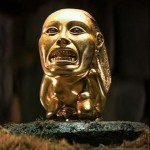 treasure. The music reaches a crescendo as archaeologist and audience lives to reach the cave entrance and final safety. The huge rock seems to gain on Jones through every twist and turn. I am emotively willing Indiana Jones through the cave. I am committed to beating the cave. I am eating popcorn without thought. Finally, the hero launches himself through the entrance, leaving the boulder behind. I briefly, ever so briefly, breathe a collective sigh of relief with the rest of the audience. Just before the next scene commences, I look down at my jumbo container of popcorn. In ten minutes, I had consumed every kernel.
treasure. The music reaches a crescendo as archaeologist and audience lives to reach the cave entrance and final safety. The huge rock seems to gain on Jones through every twist and turn. I am emotively willing Indiana Jones through the cave. I am committed to beating the cave. I am eating popcorn without thought. Finally, the hero launches himself through the entrance, leaving the boulder behind. I briefly, ever so briefly, breathe a collective sigh of relief with the rest of the audience. Just before the next scene commences, I look down at my jumbo container of popcorn. In ten minutes, I had consumed every kernel.
I was shocked! How could I have eaten a huge amount of food so quickly? What would have compelled me to do such a thing? When was it that my mind disengaged from my hand-to-mouth popcorn frenzy? And then it dawned on me: it was the music.
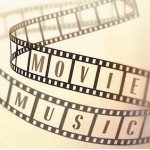 Music is a manipulator. Think about it. When we enter the supermarket, soothing symphonic strains waft through the air. Why? The supermarket wants to keep us there. The supermarket wants us to take our time. The supermarket is lulling us into a trance. The supermarket wants us to buy more. The supermarket uses music to make us, move us, manipulate us. Music is a muse. A muse whispers in our ear, “Listen. Let me tell you what to do.”
Music is a manipulator. Think about it. When we enter the supermarket, soothing symphonic strains waft through the air. Why? The supermarket wants to keep us there. The supermarket wants us to take our time. The supermarket is lulling us into a trance. The supermarket wants us to buy more. The supermarket uses music to make us, move us, manipulate us. Music is a muse. A muse whispers in our ear, “Listen. Let me tell you what to do.”
Great movies use music as well as other devices to tell a story. Hollywood spends millions of dollars on any given movie to capture audience attention. Music is subversive in that sense. We are not thinking about the music while we watch the movie for the first time. Action films depend on music, loud and fast. Love story scores lead us gently toward love. Children’s story music lulls us into the arms of our favorite stuffed animal. Dramas are known for mystery, suspense, tension, and surprise, using symphonic music to communicate dread, fear, alarm, and passion. There is a reason why the Academy Awards give Oscars for Best Musical Score. The music helps tell the story. The music moves the audience. The music makes us eat more popcorn.
Why did I eat my buttered popcorn so fast? I blame the music. Then I blame myself. 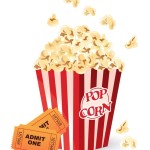
Everything in a movie is there for a purpose: music, script, actors, set design, color, dialogue, words, repetition. Movie goers must be aware that there is a direct line between popcorn consumption and the music, or the script, or the dialogue, etc. Directors, producers, editors, photographers, and musicians are hired to compel our movie experience. The work these folks do with so many elements of a film do indeed impact us.
 Here are ten questions to ask about any film and about how that film moves us to feel, to be, to act, to eat.
Here are ten questions to ask about any film and about how that film moves us to feel, to be, to act, to eat.
1. How does the music carry the message of the movie?
2. How does the director influence the message of the movie?
3. What impact do the choice of actors bring to the movie?
4. How are colors used in a movie to communicate ideas, moods, or purpose?
5. If a movie has great dialogue, what does this tell us about movie scripts?
6. How is repetition used in dialogue, scenery, clothing, or action in a movie?
7. Why is set design and movie location so important in a film?
8. Why were some scenes deleted and others kept in the editing of a movie?
9. How does a movie’s cinematography or photography make an impression on the viewer?
10. When the credits roll after a film is finished, hundreds of supporting staff are listed. Why are all these folks so important?
************
Mark loves to watch movies. He has been teaching his students how to watch movies for 30 years. The story in this essay will be one of many Dr. Eckel tells in his next book When the Lights Go Down: Watching Movies as a Christian So We’re Not Left in the Dark. A number of other stories about movies as well as movie reviews can be found on this site.

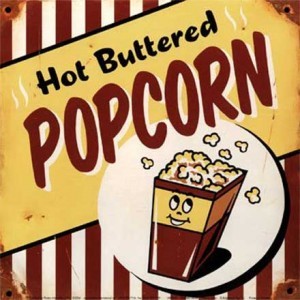
Did the music buy the popcorn? Typical American blaming something else for bad habits. 🙂 I liked the article Marcus, solid job writing as always.
My wife and I have OFTEN talked about the music we find playing in our movies and in our video games. Some of the music is so good that I actually like to find the music on Youtube and listen to it. A classic example of this, from movies, is Casper’s lullaby, from the live-action movie Casper. The movie itself is not one of my all-time favorites, but I really enjoy that song. One movie that has a fantastic musical score is Gladiator with Russel Crowe. Without the score, that movie would not be near as powerful or good.
I enjoy musicals and am always glad when I see one (movies, that is–I don’t usually have the money for live theatrical performances). This is one of the things I like about the old Disney movies (before they went CGI). They had a lot of music to them, and this music always fit the cultural setting of the movie. It immersed you. Music is good at directing your thoughts and actions, as well as immersing you.
As for games, I’ve heard some great music. There is a strategy game called Rise of Nations. They have two separate scores, one that plays while the player is not engaged in battle and one that plays when battle is going on. There is a song that plays when battle is going on called Battle at Witch Creek. There’s an old Playstation game called Medievil about a skeleton knight who has to save the kingdom from an evil sorcerer. The game is cartoonish and spooky, and the soundtrack to go with it creates that same kind of feeling. It’s almost Danny Elfman/Tim Burton-ish. And, finally, there are some songs from horror games that I like, less for their sound, beauty, or colorful flavor and more for the kind of tension and fear that they add to the gameplay. The Resident Evil games (zombies) are particularly good at this with their music. Music from the Mass Effect games is also quite wonderful.
I think this article hit the nail on the head. Music is critical for movies and video games alike. They set your mood, sway your action, and create immersion to maximize your movie watching/video gaming experience. Thanks for another great work, Dr. Eckel!